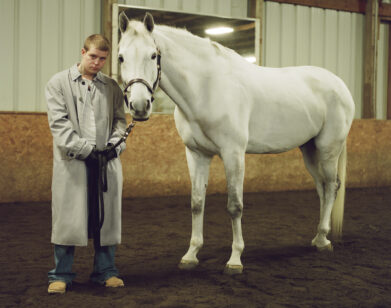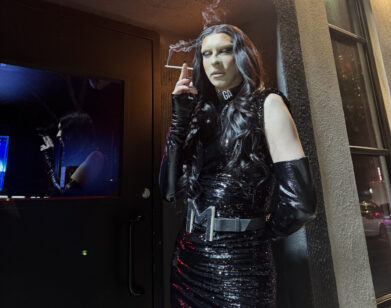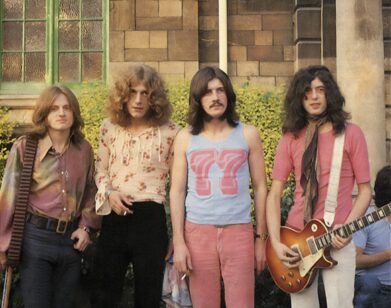Discovery: Phone Tag

ABOVE: (FROM LEFT TO RIGHT) BODHI LANDA, GRYPHON GRAHAM, ELIZA WALTON, AND NOAH HANLON. PHOTO BY CHRISTOPHER GABELLO.
“A life in music is a life well spent,” Gryphon Graham of Phone Tag tells us, quoting Pavarotti, when we ask him if he’d ever cease pursuing music as a profession. “It nourishes all parts of me, except maybe occasional physical nourishment, but I’m working on that.”
A brave stance, it’s difficult to distinguish yourself as a synth-pop band in the Brooklyn DIY scene—but then Phone Tag isn’t your average synth band. For one, the band places equal importance on their live show as on the quality of their production. Friends since they were teenagers in Texas (they’re now in their early 20s), Eliza Walton, Bodhi Landa, Noah Hanlon, and Graham experiment with layers of synth, samplers, and vocals on their debut album, but they adjust their set lists to fit a live quartet. Some of their more ambitious songs, such as “USA,” don’t make it into the live act—”it would require some sort of external sequencing, a degree of artifice that I’m not comfortable incorporating,” Gryphon explains—but plenty of their more accessible pop songs do. “I was tired of going out and not seeing actual instrumentation happening in front of me,” says Hanlon, the band’s drummer.
What is perhaps most surprising about Phone Tag, however, is the void of competition the members, the void of ego. Walton, Landa, and Hanlon happily defer to Graham, who writes all of Phone Tag’s songs. “To the extent that we write with Gryphon, it’s ‘How are we going to make this live with four people, a bass guitar, a guitar, one synth player, and a drum kit,'” says Hanlon, the band’s drummer.
Interview recently spoke with Walton, Landa, Hanlon, and Graham about space, the 1984 film Breakin‘, the financial crisis, and Graham’s love for the 808 cowbell. The band kindly gave us an exclusive premiere of their eponymous album, which you can stream here.
HOMETOWN: Austin, Texas
CURRENT LOCATIONS: Brooklyn and Queens, New York.
WARM UP SONG: Graham: Maybe Toto’s “Africa”? [all laugh] I think we can all get behind that.
Landa: Absolutely.
Walton: It’s an all-time favorite.
Hanlon: It’s the jam.
Landa: We have done it for karaoke, like, rehearsed. There was a time when we tried to play it live, also, back in the pre-history of Phone Tag. We almost did it…
FIRST MEETINGS: Landa: We had been—in various different combinations—in bands together in high school. Noah, Gryphon, and I were in a band; Gryphon and Eliza were in a band for a while, Noah and Eliza were in a different band.
Hanlon: We had a band for a week.
Landa: I only knew Gryphon because we were in a band, but we didn’t really chill. [laughs] We liked each other a lot and we liked playing music together—[Gryphon, Eliza, and Noah] kind of had a friend group that I didn’t really know anything about.
Landa: Austin has a very specific live music-orientated culture—that’s how you have fun when you’re a teenager, playing in whatever really shitty band. That’s where our idea of fun originated.
Hanlon: And terror.
Landa: Yeah, severe performance anxiety.
THE HISTORY OF PHONE TAG: Landa: [Gryphon and I] have been doing Phone Tag for almost three years—what we were doing what was called Phone Tag, but it was all the old, old music that no one ever hears. The secret pre-iteration of Phone Tag.
Graham: It’s like, if you pull out an embryo before a certain time, it’s going to die. [all laugh] Where we define human life here, as a band.
Hanlon: We’re about ready to cut the umbilical chord.
Graham: This is our first record. We got together in 2009, I was trying to do something where we had a more fleshed-out live band, we wanted to be more flexible on stage.
Landa: I disappeared for a little while because I was trying to finish college.
Graham: He had a finishing time, and in that period I approached Eliza about playing keyboards. The live act started out with Bodhi and I, and then Bodhi went to school, [and] Eliza played keyboards and we had a two-piece situation worked out, drum beats in the background. Eventually we were like, “Scrap that, we can be a four-piece and have a totally live band and if the songs can stand up to that, that it would be great.” Over the past year we’ve been playing, working towards the idea of doing a tour.
THE SMALLEST CROWD WE’VE EVER PLAYED TO… Landa: Zero? [laughs]
Hanlon: I’ve played to zero. I’ve played to the sound guy, for sure. Just the sound guy.
Graham: I’ve probably played to the sound guy, but I’ve definitely blanked it from my memory. I’ve got to keep some upper-level limits when it comes to memory, otherwise… if the best was too good, how would you recapture it? If you remember how much it sucked to play to no one, it would be a disincentive.
MURDER ON THE DANCE FLOOR: Hanlon: Who has the best dance moves? Definitely me. [laughs]
Graham: I’d say it’s a toss-up between Bodhi and Noah, definitely.
Walton: I’ve seen Bodhi dance as much as I’ve seen Noah.
Graham: But Noah really likes to dance. Noah will start dancing without music on. He’s one of those wiggly kids.
FAVORITE DANCE INSPIRED FILM? Hanlon: No.
Landa: Dirty Dancing!
Walton: I like Breakin’.
Hanlon: I just watch Michael Jackson music video DVDs. I don’t actually have any of them, but I’ve definitely watched them with friends late at night, after partying, just be kind of jacked up.
Landa: Anyone seen Strictly Ballroom?
FROM THE DOW TO THE 808 COWBELL : Graham: [Blogging about the financial crisis] is a thing I did for, like, a couple of years. Could you blog about the financial crisis for more than two years? I don’t like paying attention to stuff that is that doomsday-seeming for too long, and there was less news eventually. Moving to New York was kind of, “I’m going to move into the belly of the beast and totally forget about that.” Because I totally freaked out about it. Of course I still maintain a casual interest and read the news and stuff, because I want to be informed.
Landa: Which is why he makes pop music. [laughs]
Graham: Escapist pop music? For sure.
“WHEN I THINK ABOUT YOU I FEEL LIKE A STRANGER IN MY OWN SKIN.” DISCUSS: Graham: [Is a line from “USA.”] There’s several levels that I suppose you could interpret it on. Sometimes, if you’re having a conversation with someone who is important, you have this feeling like you’re going to need to remember this later, so there’s this sense of being outside of yourself in that moment. You could be self-conscious or you could just be self-aware: “I need to remember this. Turn on the high-definition recording mode.” At the same time that you’re doing that, you’re also somehow displaced from that personal point, so that tug, that push that you feel on yourself is what I was thinking about. But you could interpret it lots of different ways, it could be the USA for example. [The title of the song] actually stood for the United Space Alliance, Eliza had this projector that she found that had weird old space slides she got when she went to Florida and we were checking it out. We kind of use them in the video that we’re going to have out later.
Hanlon: He likes space, we all like space.
FUCK, MARRY, KILL; MUSICAL INSTRUMENT EDITION: Landa: Shall we do this by consensus?
Walton: I don’t really like saxophones that much.
Hanlon: What? I love saxophones.
Graham: Sax is not going to make its way onto any Phone Tag record any time soon.
Hanlon: News to me.
Graham: Kill the saxophone, the idea of having sex with a computer…
Landa: Computer lovin’.
Hanlon: Marry something percussive.
Graham: The shaker? The 808 cowbell? I would marry the 808 cowbell, it finds its way into nearly ever piece of music I make. I love it, can’t get enough.
Walton: But what if you only had cowbell for the rest of your life?
Graham: I would definitely marry a marimba; it’s got that great mahogany.
Hanlon: I strongly disagree with the saxophone, but it’s okay. What is that thing that Jonny Greenwood [of Radiohead] plays all the time, that’s really awesome?
Graham: An ondes Martenot? It’s like a theremin but you play it with a string, it has a little sleeve for your finger to fit into and you can waver the pitch.
Hanlon: Either way, kill that because it’s way too complex for me too understand. [all laugh]
IN FIVE YEARS WE’D LIKE TO BE… Walton: On the moon.
Graham: Do you really think you can be on the moon in five years?
Walton: Probably not, unless I start going to astronaut school right now.
Hanlon: You have to be tall to be an astronaut.
Landa: I would like to be working more on records, and less on other jobs—I work at a restaurant. But hopefully in five years, we’ll be touring.
Hanlon: I agree. I just want to keep doing what we’re doing, but more of it, and not have to worry about paying bills. I work at a restaurant, DJ some nights, bartend and I’d like to… not be doing that.
Graham: In five years, I’ll probably be in New York, but I’m not married to that. I’ll definitely have seen more of the world in five years. It’s hard to say exactly where I’ll be, whatever I say, it will probably be the opposite, but I’m going to go ahead and say in the middle of China.
Landa: I think maybe you interpreted that question a little too literally, I think she meant “What in life,” not…
Hanlon: “Yonkers.” [all laugh]
Graham: I would say I’m going to keep making records, touring, recording, producing other people by that point hopefully, cause I love production work. Nose to the grindstone.
MAKING IT IN THE BROOKLYN DIY SCENE:
Walton: It’s a really supportive community. It might be hard to get noticed sometimes, because they’re so many bands.
Landa: It seems kind of shockingly uncompetitive—all these people in bands go to see other people in bands. There are definitely bands in the Brooklyn DIY scene that I don’t want to listen to personally, as a listener, but they’re really more about a sense of community.
Hanlon: We all knew that being here and playing music would probably be the most beneficial place for us.
Graham: The push to do something really exceptional is, I think, great here. I function very well having constraints and deadlines—pressure—I work better under pressure and if I don’t have it, I get lazy. It’s good for me to be in a place where I’m like, “Whoa. This is some next-level shit.” Even if it’s not something I’d necessarily listen to, clearly these people work at it and are very good at what they do and believe in it, and I think that rubs off.
Walton: People working hard makes you work hard.
DECIDING DISAGREEMENTS: Walton: We bicker, and then Gryphon gets to choose.
Hanlon: It’s never that we’re arguing about an arrangement or a sound, it’s generally, “Is this show worth playing?”
Graham: “Don’t talk about the financial crisis this time. Really, you shouldn’t.”
PHONE TAG’S DEBUT ALBUM, PHONE TAG, COMES OUT TUESDAY, SEPTEMBER 18. THE BAND ARE PLAYING A SHOW WITH FRIENDS AT 285 KENT STREET, BROOKLYN, NY ON SEPTEMBER 27. FOR MORE INFORMATION, VISIT THEIR FACEBOOK PAGE.






